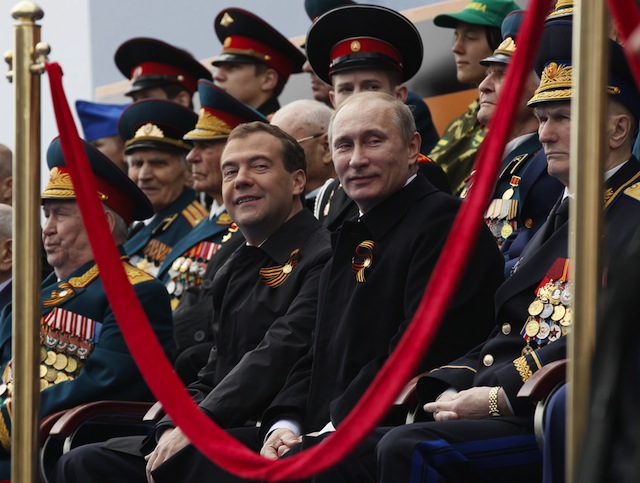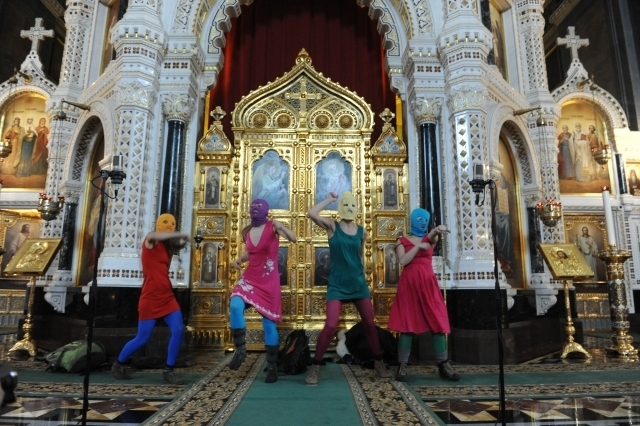The Russian government has passed many laws that limit criticism. Under the cover of fighting for eternal values, the builders of the new authoritarianism have adopted a cynical approach to achieving their political goals. Author and analyst Alexander Podrabinek reasons through the regime’s myths and insecurities.

One of the key myths of the regime is that of the "Great Victory" in World War II.
Our authorities are surprisingly touchy. Sometimes it seems that they lack a sense of irony. It is noticeable that the regime cannot stand any criticism, taking cheap revenge on anyone who expresses disapproval of it. You might think that the regime is powered by insecure young men whose utmost concern is how they appear to the outside world. Vladimir Putin formulated this attitude very clearly and in his usual manner: “Whoever offends us would not live three days.”
In fact, the authorities’ insecurities on a cosmic scale are not indicative of a state of mind or emotional incontinence; rather, they represent a platform for an ideology that is based on prohibition and restriction. So far, this ideology looks wild, worthless, and ugly—but over time, this will become the norm.
The first sign of this phenomenon was a trial that took place in 2004–2005, the case of the Sakharov Museum’s Caution, Religion! exhibition. Orthodox fundamentalists were offended by what they saw as the exhibition’s disrespectful attitude toward the church and, with the support of prosecutors, won the convictions of the two organizers of the exhibition, Yuri Samodurov and Ludmila Vasilovskaya. At the time, the authorities were satisfied with levying heavy fines on the defendants, but it was clear that the authorities were just testing the waters. The direction future prosecutions would take was clearly defined by the authorities. At the trial, the lawyer of one of the defendants said: “Today in the court, the prosecution has explained to the artist how he doesn’t have to paint and how he must relate to religion and to God. Tomorrow, it will show us strictly how we must write a book, shoot a movie, and compose music. And the day after tomorrow, we will be prescribed how to dress impeccably, how to have sex, and with what expression we should look at the leaders of our state.”
That is exactly what happened. To date, 1,925 books and musical works have been included on the federal government’s list of extremist material and banned; movies labeled “politically unreliable” cannot get a television broadcast or rental license, not to mention any domestic financing; a dress code has been introduced in educational institutions; and a law that separates sex into categories of “right” and “wrong” has been enacted.
The authorities’ insecurities on a cosmic scale are not indicative of a state of mind or emotional incontinence; rather, they represent a platform for an ideology that is based on prohibition and restriction.
The authorities have also shifted from fines to real prison terms. In 2012, two members of the band Pussy Riot, Nadezhda Tolokonnikova and Maria Alekhina, were sentenced to two years in prison after Orthodox churchmen took offense at the women’s 40-second presentation in a church. Under the strictest but still legal approach, it was only possible to sentence them to a maximum of 15 days of administrative arrest.
It is important for the regime to show who can be insulted and who cannot. Punks from Orthodox fundamentalist organizations and neo-Nazis who attack gays can go unpunished. Aggressive nationalists can persecute foreigners and migrant workers without any consequences. Members of the Duma, officials, and priests can crush pedestrians on the streets of Russian cities and get off with ridiculous punishments. High-ranking corrupt officials can remove unnecessary witnesses easily and, when caught, avoid responsibility or receive suspended sentences. Poaching, building mansions and palaces in conservation areas, grabbing land and coastlines—all of these have become everyday occurrences.
To protect their illegal privileges, the authorities have passed many laws that restrict criticism of the regime and any possibility of opposition activity. The builders of authoritarianism do not limit themselves to purely pragmatic goals such as protecting their legal interests, property, and tenure in power. They strive to create an atmosphere of hysterical defense of those values that seem to comfortably further their own political aims. These values fit well within the three-part framework that was outlined by Minister of Education Count Uvarov in the nineteenth century: autocracy, orthodoxy, and nationality. The only difference between this framework and that of the authorities today is that the autocracy appears in the more modern form of authoritarian rule, named in Russia the “vertical of power.”
The authoritarian institution defends not only the “anti-extremist” laws and the judiciary system, which is controlled by the government, but also the lawlessness that is prevalent in today’s society and the military-police forces. Orthodoxy is protected by the granting of privileges to the Church and the recently passed law on liability for offending religious feelings. Nationality (within the meaning of Count Uvarov) is reduced to attempts to limit “corrupting” foreign influences, to continued confrontations with the Western democracies, and to the search for a special Russian way—it does not matter what, as long as it is unlike any other.

In 2012, two members of the band Pussy Riot were sentenced to two years in prison for their 40-second performance in the Christ the Savior Cathedral in Moscow.
In everyday life, the regime cultivates a few common myths that in its judgment should become the basis for national morality. These include most prominently the myth of the “Great Victory,” the myth of the ongoing intrigues of the envious West, and the myth of Russia as an Orthodox country. In this case, the myths are based on real events, but the state’s propaganda machine gives them a meaning that they didn’t originally have.
Indeed, the Russian victory over the Nazis in World War II is well known, but by trying to ban any discussion of this topic and brushing aside any doubts or nontraditional interpretations of it, the government aims to make the subject sacred, inviolable, and, in fact, mythical.
In real life, this stance has produced some monstrous oddities. The grassroots authorities have quickly understood the “general line” and rushed to protect the sacred values. On May 9 in Stavropol, several drunken young men decided to take a picture near a military monument of a T-34 land tank. One of them had the Russian flag in his hands; the other held an inflatable rubber doll from a sex shop. As he explained later, he also went to the beach to swim on his inflatable girlfriend. One of his female friends took pictures of the group and then placed the photos on a social network.
The consequences of this episode were most severe. Three people were detained. The behavior of another, a student in his fifth and final year at Stavropol University, was discussed by the Supreme Board of the Student Council. This wonderfully named body of the student government came to the conclusion that a student prank—described as the desecration of the Stavropol monument—“is not only not worthy of someone bearing the title of a student of the University, but is also not permissible for any conscious citizen of the Russian Federation.” The student was expelled from the university for immoral behavior.
The detainees were charged under Article 244 of the Criminal Code (“the desecration of the dead and their burial places”), or more precisely, under Part 2 of this article, which equates sculptures and architectural installations with gravesites dedicated to the fight against fascism. In addition, two of the students were accused of disorderly conduct, and the photographer—a 23-year-old girl—of the illegal manufacture and distribution of pornography. The case is currently in the court system, and the defendants could each face up to seven years in prison.
In everyday life, the regime cultivates a few common myths that in its judgment should become the basis for national morality. These include the myth of the “Great Victory,” the myth of the ongoing intrigues of the envious West, and the myth of Russia as an Orthodox country.
Local authorities protect Orthodox values no less zealously. Recently, leaders in the Voronezh region banned the staging of a costume show at Morozovka village’s Neptune Festival. The decision was made under pressure from the local Orthodox community, which did not like that the festival was held with the participation of artists and included costumed mermaids, mermen, and various characters from fairy tales. At the same time, officials who had learned the “general line of the Party” banned the celebration of the Day of Ivan Kupala.
In regions where attacks on Orthodox values have not been committed, local authorities have found other occasions to demonstrate their loyalty and understanding of the moment. The prosecutor's office of Tatarstan recently began investigating photos of a girl who was posing frivolously next to the Palace of Farmers in Kazan. The pictures were published on social networks. The authorities have decided to bring a criminal case against her on charges of manufacturing and distributing pornography. Whether the farmers should be equated with the Orthodox establishment or the heroes of the war is not yet clear. Perhaps this decision will be left up to the regional authorities.
Today, the authorities react too seriously to stupidity, producing a state-run mechanism of bans and repressions. A sense of resentment and wounded national or religious dignity is being cultivated in society. It will take a bit of time, but eventually someone will be put in prison for poking an eye in Putin’s photo, as people were once imprisoned for 10 years on charges of terrorism for desecrating images of Stalin.

